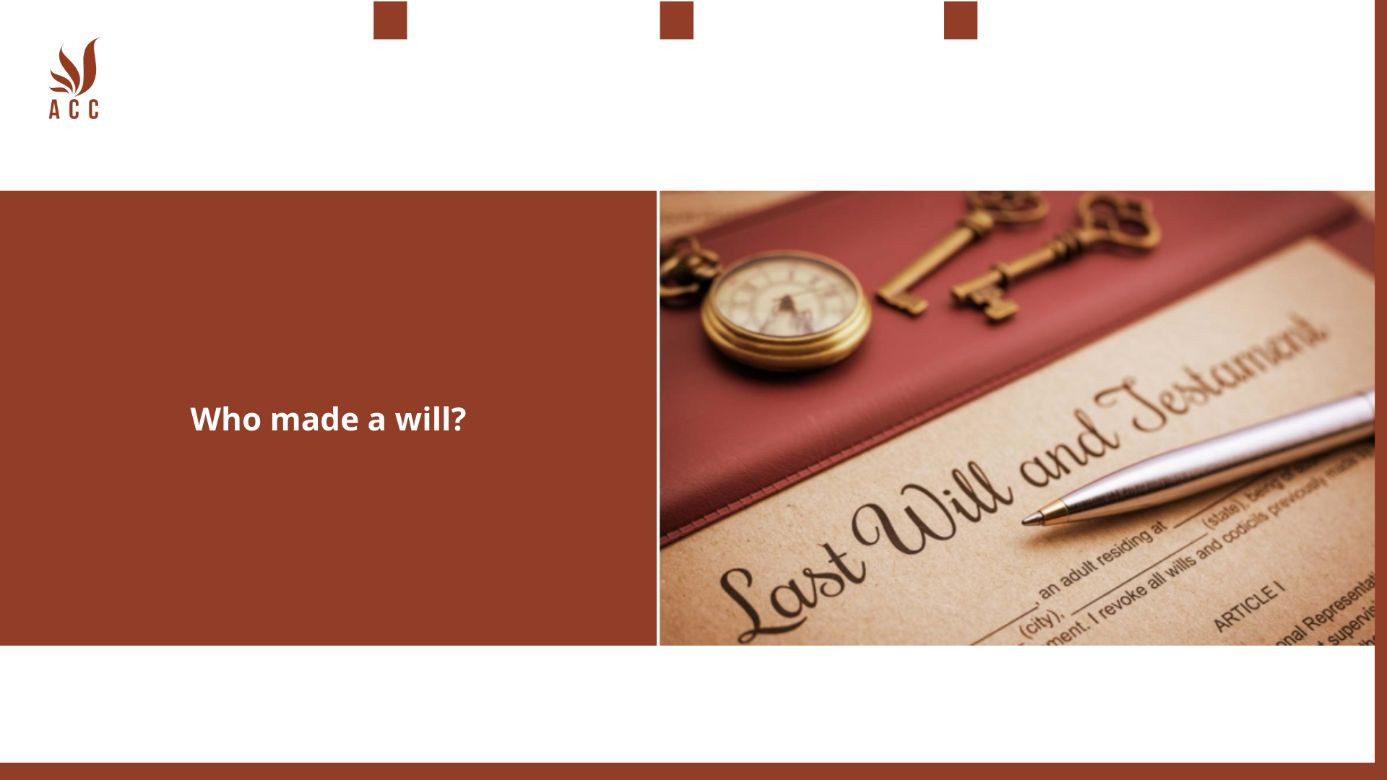A will is typically made by an individual referred to as the "testator" or "testatrix." The testator is the person who creates the will to specify how their assets and property should be distributed after their death. The act of making a will is a legal process in which the testator outlines their wishes and intentions regarding the inheritance of their estate. Here are some key points about the individual who makes a will:

1. Legal Capacity:
To make a valid will, the testator must typically have the mental capacity to understand the nature and extent of their assets, the consequences of creating a will, and who their natural beneficiaries are. This requirement ensures that the testator is making informed decisions.
2. Age Requirement:
The testator is generally required to be of legal age, which is typically 18 years or older, to create a valid will. Some jurisdictions may allow minors to make wills under specific circumstances, such as being married or serving in the military.
3. Legal Formalities:
Wills must typically adhere to specific legal formalities established by the laws of the jurisdiction in which they are created. These formalities may include the need for the will to be in writing, signed by the testator, and witnessed by individuals who are not beneficiaries.
4. Revocation and Amendment:
The testator has the right to revoke or amend their will at any time, provided they have the necessary testamentary capacity. This can be done through the creation of a new will or a codicil (an amendment to the existing will).
5. Beneficiary Designations:
The testator specifies who the beneficiaries of their will are. These beneficiaries can include family members, friends, charities, or other entities. The will outlines how the testator's assets and property should be distributed among these beneficiaries.
6. Executor or Personal Representative:
The testator may appoint an executor or personal representative who is responsible for carrying out the terms of the will, including distributing assets, paying debts, and administering the estate.
7. Intention:
The will should reflect the testator's true intentions regarding the distribution of assets and property. It should clearly specify who the beneficiaries are and how assets are to be distributed.
8. Legal Compliance:
The will must comply with all relevant laws and regulations of the jurisdiction where it is created. Failure to meet legal requirements may render the will invalid.
9. When using ACC Law Firm's testament, entrepreneurs will receive
10. Q&a
Who can make a will?
Any individual who meets certain legal requirements can make a will. Typically, the following criteria must be met:
Testamentary Capacity: The person must be of sound mind and have the mental capacity to understand the nature of making a will, the extent of their assets, and the implications of their decisions.
Age Requirement: Most jurisdictions require the person to be at least 18 years old to create a valid will.
Voluntary Intent: The person must create the will voluntarily, without undue influence or coercion from others.
Legal Formalities: The will must adhere to legal formalities, such as being in writing and signed by the person (the testator) and, in some cases, witnessed by others.
What are the benefits of making a will?
Making a will offers several benefits, including:
Control: The testator can specify how their assets and property should be distributed among beneficiaries.
Appointing an Executor: The testator can appoint an executor to manage the estate and ensure their wishes are carried out.
Guardianship: If the testator has minor children, they can designate guardians in the will.
Avoiding Intestacy: Without a will, the estate may be subject to the laws of intestacy, which may distribute assets differently than the testator's wishes.
Tax Planning: A well-crafted will can help minimize estate taxes and protect assets.
Can someone be legally prevented from making a will?
In some cases, legal restrictions or limitations may prevent someone from making a will. For example:
Lack of Testamentary Capacity: If the person lacks the mental capacity to understand the nature of a will, they may not be able to create one.
Duress or Undue Influence: If the person is coerced or influenced against their will, the resulting will may be contested or invalidated.
Legal Incapacity: Depending on the jurisdiction, certain individuals, such as those declared legally incapacitated, may be restricted from making a will.
What happens if someone dies without making a will?
If someone dies without making a will (intestate), the distribution of their assets is typically determined by the laws of intestacy in their jurisdiction. The exact distribution can vary, but it often prioritizes surviving spouses, children, and close relatives. Intestacy laws provide a default mechanism for asset distribution when there is no valid will.
Nội dung bài viết:






Bình luận